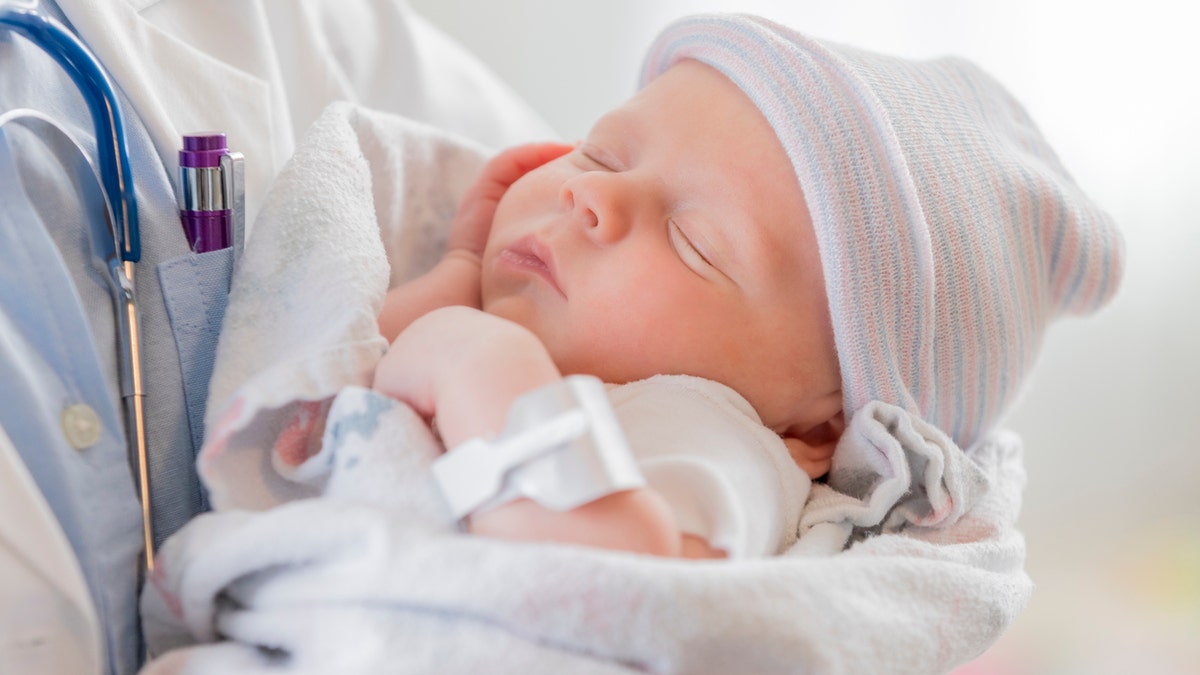
A Caucasian female infant is asleep in the arms of a pediatrician. The baby is swaddled in a blanket and is wearing a warm cap. (iStock)
Every year, about 120 million children around the world develop pneumonia and about 1.8 million children under 5 die of the disease. But that number may be about to come down, thanks to the work of researchers affiliated with two children's hospitals in Pennsylvania and Ohio. They found that cultivating healthy gut bacteria in newborn mice strengthened their lungs' ability to fight off pneumonia.
It stands to reason that the same is true for humans. And that shouldn't be surprising. Scientists have long known that an infant's microbiome – including bacteria, fungi, and viruses – has an outsized impact on the child’s health and immunity, even into adulthood.
Consequently, parents would be wise to do all they can to promote a healthy microbiome in their little ones.
Scientists are only beginning to understand the microbial ecosystem that flourishes inside our bodies, where trillions of microbes work together to facilitate digestion and guard against disease.
Prior to birth, babies have virtually no microbes. Their microbial infrastructure is largely established during the first three years of their lives. It affects everything from adult metabolism, to the immune system, to digestion – and determines cognitive, metabolic and urinary functions.
That process begins during birth. As soon as babies exit the womb and enter the birth canal, they are exposed to a host of friendly microbes. These microbes train babies' immune systems, helping to avoid infections and diseases late in life.
For example, infants with too much of a certain bacteria that creates gas and a shortage of another bacteria that reduce inflammation often have upset stomachs. Unsurprisingly, they're far more likely to be fussy.
In addition, an unhealthy microbiome can lead to allergies. Researchers at the University of Alberta in Canada measured several strains of bacteria in 3-month-old babies and followed up years later. They found that infants with a less-sturdy intestinal infrastructure were more likely to have developed allergies to peanuts, milk and eggs.
Asthma is also tied to our intestinal fauna. A study from the University of British Columbia in Canada discovered that babies lacking an ample supply of four specific types of bacteria were far more likely to suffer from asthma as they grew up.
The list goes on. Diarrhea, obesity and anxiety are all linked to unhealthy bacterial ecosystems in babies.
Fortunately, there are several simple ways to ensure that babies develop a healthy microbiome.
The first one should be music to harried parents' ears: Quit worrying so much about cleanliness.
Little ones who are allowed to play outside, share the germs of their families and friends, and make the occasional mud pie are actually building the foundations for better immune health. Spending time outside can also reduce the stress levels of babies and children, which in turn allows their intestinal bacteria to flourish.
Parents may also want to think about getting a puppy. Dogs bring their own bundle of bacteria. Kids who grow up with a pet often enjoy an immunity boost, as well as decreased rates of allergies and obesity.
Finally, parents should pay special attention to what goes into their babies' bellies. Breast milk is loaded with crucial immune-boosters called Human Milk Oligosaccharides – HMOs for short. These provide the best possible fuel for the good bacteria in an infant's microbiome and run interference against many nasty pathogens.
Of course, breastfeeding is not always an option. Fortunately, scientists have made significant strides in research related to HMOs. In a 2016 study published in the Journal of Nutrition, for instance, researchers at Abbott found that babies who consumed an experimental formula containing HMOs had blood immune marker responses that were similar to babies who were breastfed.
So Abbott developed the first-ever formula containing 2'-FL HMOs – the most abundant HMO in most mother’s breast milk.
All parents are trying to ensure that their babies are as healthy as possible. Science is increasingly revealing that good microbes may be the best gift a parent can give a child.




















